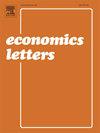更智能的供应链,更强的弹性?人工智能对准备、响应和恢复的影响
IF 1.8
4区 经济学
Q2 ECONOMICS
引用次数: 0
摘要
本文考察了人工智能(AI)的采用对企业供应链弹性的影响,特别关注了事件前准备、事件中响应和事件后恢复的阶段。利用机器学习增强的文本分析方法来衡量企业层面的人工智能采用情况,该研究发现,人工智能的采用通过减少供应链依赖、提高连续性和效率,显著提高了供应链各个阶段的弹性。本文章由计算机程序翻译,如有差异,请以英文原文为准。
Smarter supply chains, stronger resilience? The impact of AI on preparation, response, and recovery
This paper examines the impact of artificial intelligence (AI) adoption on corporate supply chain resilience, with particular attention to the stages of pre-event preparation, in-event response, and post-event recovery. Leveraging a machine learning–enhanced text analysis approach to measure firm-level AI adoption, the study finds that AI adoption significantly enhances supply chain resilience across all phases by reducing supply chain dependence and improving continuity and efficiency.
求助全文
通过发布文献求助,成功后即可免费获取论文全文。
去求助
来源期刊

Economics Letters
ECONOMICS-
CiteScore
3.20
自引率
5.00%
发文量
348
审稿时长
30 days
期刊介绍:
Many economists today are concerned by the proliferation of journals and the concomitant labyrinth of research to be conquered in order to reach the specific information they require. To combat this tendency, Economics Letters has been conceived and designed outside the realm of the traditional economics journal. As a Letters Journal, it consists of concise communications (letters) that provide a means of rapid and efficient dissemination of new results, models and methods in all fields of economic research.
 求助内容:
求助内容: 应助结果提醒方式:
应助结果提醒方式:


